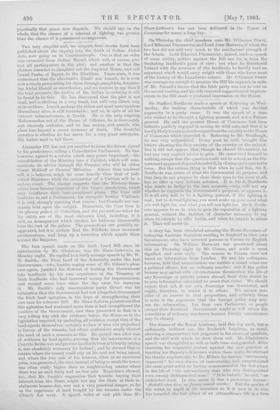The best speech made on the Irish Land Bill since
its introduction by Mr. Gladstone was Mr. Shaw-Lefevre's, on Monday night. Ho replied to a fairly average speech by Mr. W. H. Smith,—the First Lord of the Admiralty under the last Government,---who, besides urging seine of Mr. Gibson's pleas over again, justified his distrust of turning the Government into landlords by his own experience at the Treasury of Irish landlords who had borrowed money for improvements, and wanted more time when the day came for repaying it. Mr. Smith's only unscrupulous party thrust was his intimation that the Government had not altogether discouraged the Irish land agitation, in the hope of strengthening their own case for a drastic Bill. Mr. Shaw-Lefevre pointed out that this agitation had weakened more than it had strengthened the position of the Government, and then proceeded to deal in a very telling way with the evidence before the House as to the legislation required, by excluding all evidence except that of the land-agents themselves, certainly a class of men not prejudiced in favour of the tenants, but whose confessions amply showed the need of such a measure as this. He quoted case after case of evidence by land-agents, proving that the intervention of a Court to fix the rent and prevent landlords from arbitrarily raising it, was absolutely necessary for Ireland; and he showed that on estates where the tenant could rely on his rent not being raised, and where the free sale of his interest, often at an enormous price, was permitted, the tont, instead of being so much the lower, was often really higher than ou neighbouring estates where there was no such fixity and no free sale. Experience showed, too, that. Mr. Smith's suggestion that tenants buying their interest from the State, might not pay the State as their in- stalments became due, was not a very practical danger, so far as the experience of land bought by the tenants under the Church Act went. A speech fuller of real pith than Mr. Shaw-Lefevre's has not been delivered in the House of Commons for many a long day.


































 Previous page
Previous page